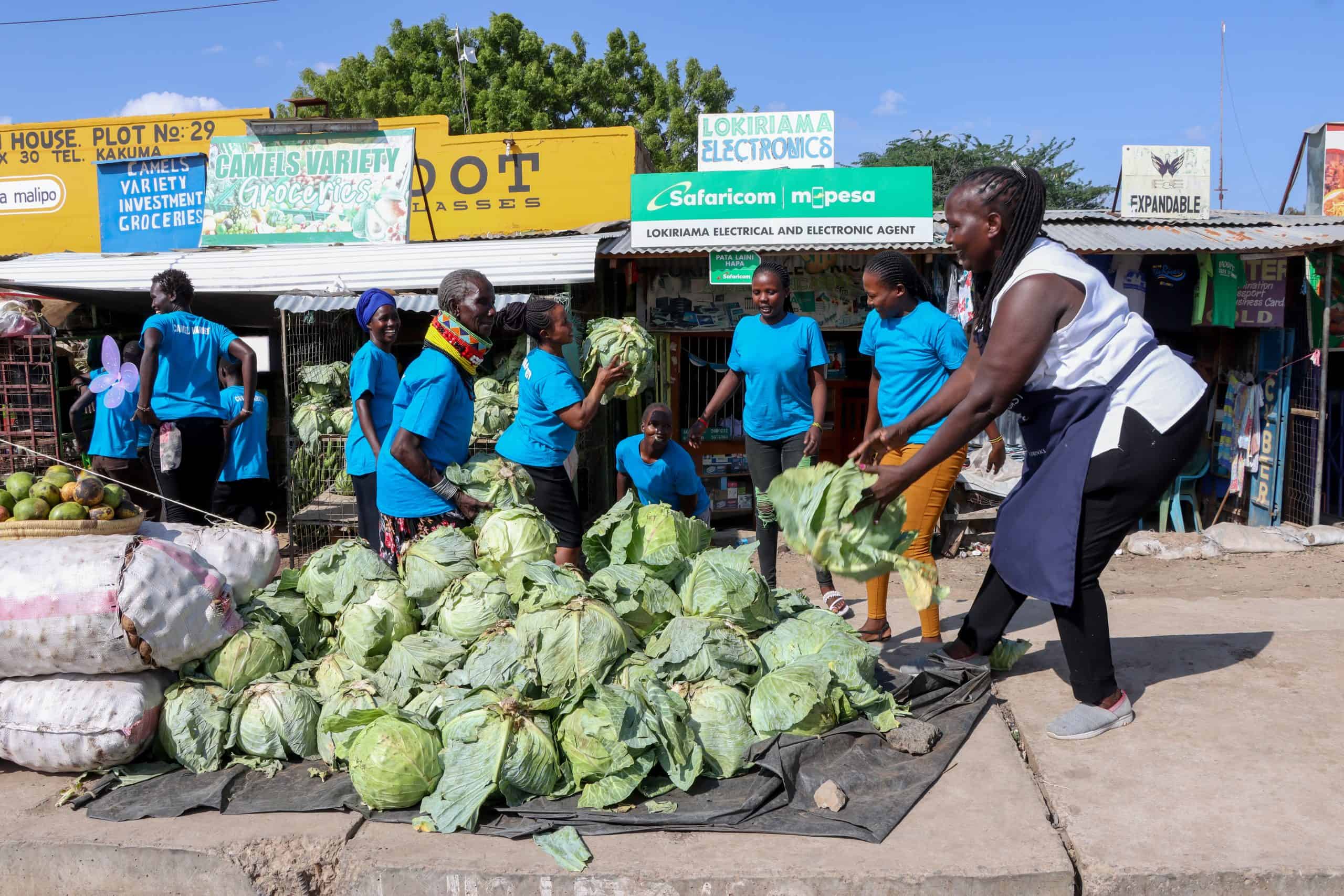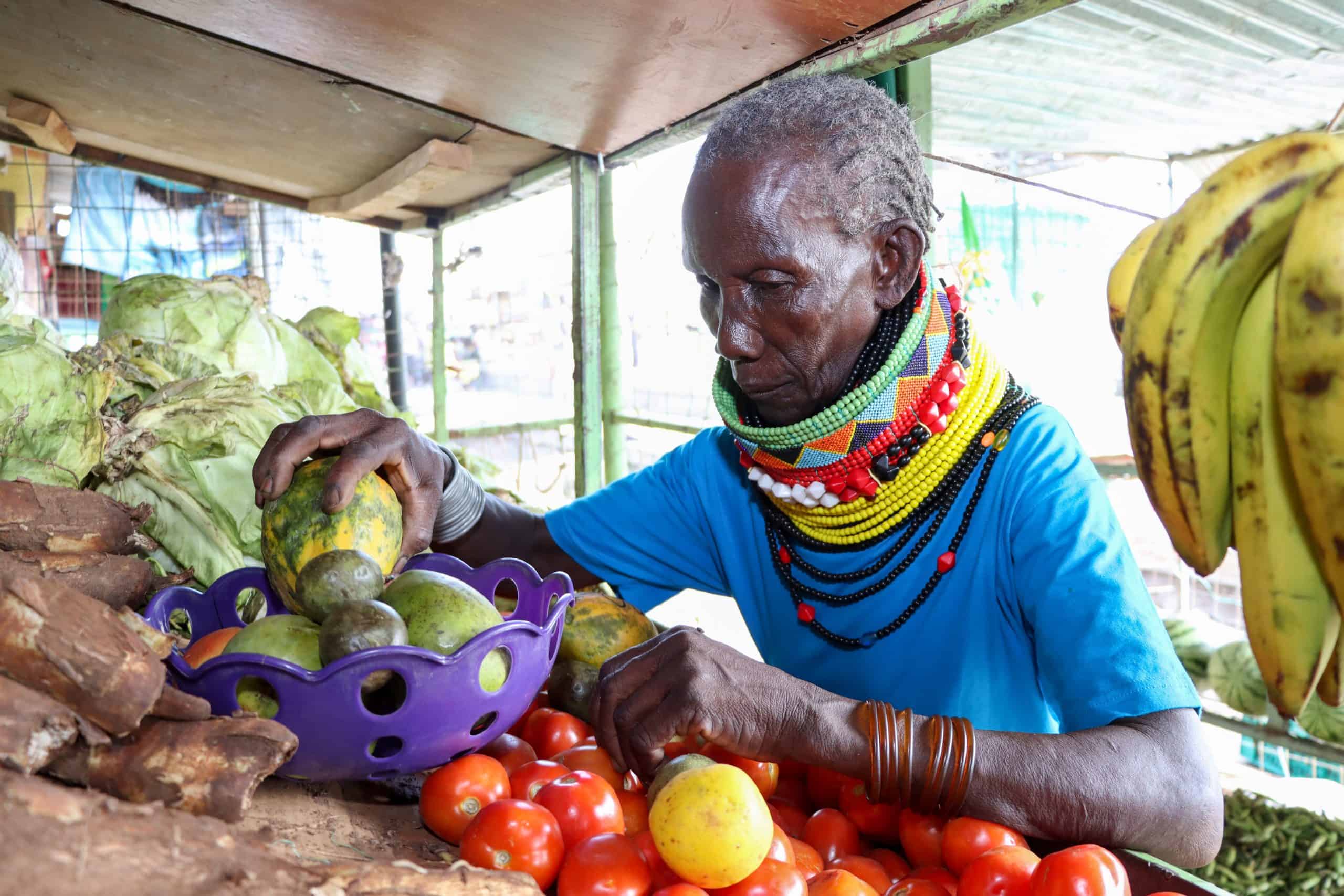Naomi Nyengai Gateru, 49, and her husband moved to Kakuma town in Turkana County to work for the many aid agencies operating in the area, home to about 300,000 refugees and a host community.
A few years later, she realized that food, especially fresh produce, was scarce in the area due to Kakuma’s hot and dry climate, which makes farming difficult. This sparked the idea that she could source vegetables, onions, potatoes, and tomatoes from her home village in central Kenya and sell them in Kakuma at affordable prices. Sourcing the goods was not a challenge since her father, a farmer, would help her source from other suppliers. However, distributing the goods inside the villages of Kakuma proved difficult.
“Initially, I considered bringing donkeys from Murang’a to pull carts loaded with fresh produce, but they are not allowed in the camp. So, I went to Moyale and bought a camel, which became my identity as I would strap baskets full of cabbages and potatoes across her back and move around the villages,” she explains.
The camel gave rise to her brand name, Camel Variety. Although she no longer uses the camel for distribution, Camel Variety has since expanded and established itself as a household grocery business, supplying traders and many families with fresh produce.

Today, Naomi runs a fully stocked shop in the heart of Kakuma town and another at her residence, a few kilometers away, where a 20-foot refrigerated container loaded with potatoes, onions, tomatoes, and cabbage stands. Traders arrive in hoards to buy stock at wholesale prices for resale in other parts of the town.
The growth of Naomi’s business can be attributed to the Kakuma Kalobeyei Challenge Fund (KKCF), which, through grant financing, enabled her to buy the refrigerated container and additional capital to expand her venture. However, she notes that sourcing vegetables and groceries remains a challenge due to the substantial capital required by suppliers. “Many farmers want people who buy in bulk, typically by truckloads. There is a perception that only men have the financial capacity to do this, so as women, we are often overlooked,’ she reveals.
To overcome these barriers, Naomi now sources her stock from other regions like Marakwet, Trans Nzoia, West Pokot, and central Kenya counties, where agricultural production thrives. “I do a lot of market research to track planting and harvesting seasons, allowing me to buy at lower prices and transport to Kakuma for resale at affordable costs,” she explains. She also expects a deep freezer and additional capital to expand her business.
According to KKCF program Manager Brian Meme, small-scale businesses like Naomi’s were supported under the Local Enterprises Development (LED) window because they are well-established and understand the local market. “These are businesses that have been operating in the area and understand the needs of the local population. Supporting them ensures a greater impact because they can scale up their existing services,” he says.
The businesses, however, needed technical assistance to bridge the business skills gap so that they could run more efficiently. When KKCF issued the first call for proposals, over 700 applicants were received, but only 36 were successful. A rapid assessment revealed a significant need for business skills training, leading to the introduction of a seven-week accelerator program. Naomi and other entrepreneurs were trained in business management, financial literacy bookkeeping, and marketing and promotion of their products.
During a visit to her shop, several employees in Camel Variety-branded blue polo T-shirts were seen distributing flyers to pedestrians. Outside, a young man announced the arrival of fresh produce while two women danced to lively music playing from large wooden speakers.

Through the training, Naomi has streamlined stock-taking and record-keeping. She has also assigned specific accounting roles to her staff, making operations efficient and rewarding. The support from KKCF has seen an increase in her sales, allowing her to employ more people. The town shop currently has 15 employees from the host community and four refugees. She plans to expand further by opening another branch in Kakuma 3, which will create additional job opportunities. Naomi says the business has empowered her to meet family needs as she earns enough. “I am determined to give more women an opportunity to serve in the business so that they achieve financial independence. This will also help minimize cases of domestic violence in the community,” she says.
To further enhance business skills among her team, three of her employees attended a seminar sponsored by the Kenya Chamber of Commerce and Industry, where they learned about gender-based violence and market surveys, among other business-related topics. These employees later trained their colleagues, fostering a culture of respect and collaboration. The three trained their colleagues at the shop.
Looking ahead, Naomi plans to diversify into other income-generating opportunities underexploited in Kakuma. She is exploring investments in fish and pork farming to meet the growing demand for the products in the area.
Her journey from a simple idea to a thriving enterprise showcases the resilience and determination of women entrepreneurs in challenging environments. With continued innovation and support, Naomi’s business is set to grow even further, creating lasting economic impact in Kakuma and beyond.
